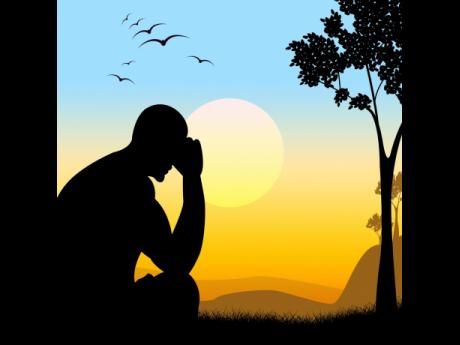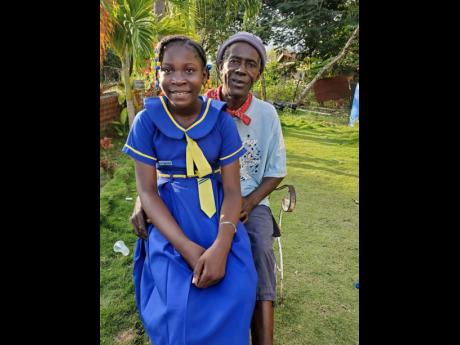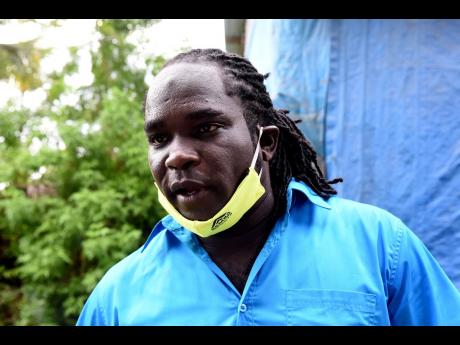Men, money, marriage, misery
Study: Financial, relationship issues major stressors for males
Delroy Lennon is a broken man, a desperate father, and a resident shaken by one of Clarendon’s toughest communities. His hardest days come with tears, but never thoughts of giving up on life. This is unlike 34 per cent of Jamaican men who say they...
Delroy Lennon is a broken man, a desperate father, and a resident shaken by one of Clarendon’s toughest communities. His hardest days come with tears, but never thoughts of giving up on life.
This is unlike 34 per cent of Jamaican men who say they would rather do away with it, a recent study by the Northern Caribbean University (NCU) has found.
“I just have to keep trying, and I give thanks for the help from people who come by and help me, but dem things there never crossed my mind,” said Lennon, a sickly father of four, who has been struggling to make ends meet since the children’s mother died six years ago.
“[She] spent about three weeks in the hospital and then she just passed away. Doctor said she had pneumonia,” he recalled. “From that, things just got rougher and rougher. This morning, me wake up with about $400, and the biggest one goes to school at Chapelton road so I just had to give it to him.
“Sometimes I can’t even talk. I just have to give God thanks,” the shopkeeper shared with The Sunday Gleaner behind a painful chuckle. “Nothing is even in the shop. God bless what is in there: three beers, one Dragon and about six sodas. So I don’t know how it is going to go.”
Lennon remembers days when he would be up and about to ensure food is on the table, but, since multiple illnesses left him weak, he can no longer jump at those ‘roasts’. His greatest motivation comes from his only daughter, the youngest, Dameika, age 10, who teachers regard as most helpful and a wonderful note-taker.
According to the NCU, stories like Lennon’s have become common after COVID-19 restrictions that decimated employment and the island’s economy. Males, in particular, are not coping well, researchers noted in the study dubbed ‘Assessing Depression in Jamaican Males: Post COVID-19’.
The cross-sectional depression probe sampled 1,066 male respondents from all parishes, and employed the Hamilton Depression Rating Scale (HDRS), the most widely used clinical depression gauge. It had a margin of error of three per cent and a 95 per cent confidence rate.
“The study revealed that 52.7 per cent of Jamaican males experience varying degrees of depression post COVID-19. Furthermore, it also found that 1.1 per cent of the sampled Jamaican males have attempted suicide, 3.4 per cent have had suicidal thoughts, 5.1 per cent wished they were dead, and 24.6 per cent feel life is not worth living,” read the findings.
“The study has brought a preview of the mental health challenges experienced by Jamaican males, and this speaks to a silent killer that is being nurtured in the minds of these individuals.”
The study further concluded that 47.3 per cent of Jamaican males have absence or remission of depression; 40.8 per cent have mild depression; 8.3 per cent have moderate depression; and 3.6 per cent of Jamaican males have severe depression.
While the study did not specifically probe the causes for the depression, Paul Bourne, acting director of institutional research at the NCU, said other recent studies have pointed to income loss and its accompanying factors as the root causes for depression in Jamaican males.
“Fundamentally, it is due to loss of income. A number of men lose their income, and, as you know, a man’s success is often tied to his income and resources. So, by losing their income, that then throws off everything,” said Bourne, noting that, during the pandemic restrictions, women were demanding more from men who were still struggling.
“So, if you have more demands coming from a woman or family and you can’t meet those demands, then that is where the depression comes in. Many men are worried that their women might go and cheat. So the reduction in income is often the root issue,” Bourne said.
SUBSTANCE AND ALCOHOL USE
He pointed out that the study showed that substance and alcohol use is being strongly employed by Jamaican males to address depression, and when those do not work, religion and denial follows. It is after this that self-distraction and self-blame often creep in.
The majority of the men sampled were between ages 18 and 30, the youngest and most at-risk cohort of men in society, but Bourne needed more scientific data to tie depression with the high crime rates in Jamaica, as that “link is a bit tricky”.
That, however, did not stop Otis James, president of the James and Friends Foundation, a charity group assisting more than 250 youth in Clarendon, from making such a connection.
Depression among vulnerable youths, James argued, flows from lack of employment opportunities, which is a product of systematic marginalisation based on upbringing, where the youngsters live, and their criminal antecedents.
“Jamaica keeps holding back the youths because of their police records, and, at the end of the day, these same youths can vote for a member of parliament or a councillor. In Jamaica, you can vote while you mix up in crime, but, at the same time, you cannot work in the government institutions run by the persons that you voted for,” he argued, recalling the difficulty he had finding work for 120 mainly young people since last year, one of them, a 40-year-old man, starting his very first job.
“Yes, the corona [virus pandemic] plays a part because a lot of the fathers juggle, sell clothes, run bar or do barbering. and that gets affected,” he reasoned. “But if [COVID-19] didn’t come in, we still would have this situation. Jamaica needs to give, especially the males, more opportunities. A lot of them come from communities that we write off and a lot of them have pasts that are holding them back.”
Even the hardest of working fathers come up short at times, said Sandra Johnson, teacher of 5K at Effortville Primary School in Clarendon.
“And you can tell that some of them are really hurt by it. For some of the students, sometimes myself and colleagues will try to help them out with books and so on. I have at least two fathers for students in my class that I know are really trying,” she told The Sunday Gleaner.
In the meantime, while the NCU study points to varying unhealthy coping strategies employed by men, psychologists decry their lack of take up of counselling services in Jamaica.
“I have more females than males who are coming in for counselling. Males have to be forced to come to counselling, maybe by an employer or an organisation. Otherwise, they are not going to come. Out of 10 persons, I may have only two males,” shared Dr Janet Walters, licensed counselling psychologist and director of NCU’s Counselling and Psychology Services Centre.
“The men often feel that whatever is happening to them is something that they can deal with and that counselling is not for them. Some men feel it makes them seem weak,” she said, listing financial challenges, relationship issues and divorce among the stressors for Jamaican men.
STUDY’S KEY FINDINGS
• 52.7% of Jamaican males experience varying degrees of depression post COVID-19.
• 1.1% of Jamaican males have attempted suicide.
• 3.4% have had suicidal thoughts.
• 5.1% wished they were dead.
• 24.6% feel life is not worth living.
• 47.3% of Jamaican males have absence or remission of depression.
• 40.8% have mild depression.
• 8.3% have moderate depression.
• 3.6% of Jamaican males have severe depression.



